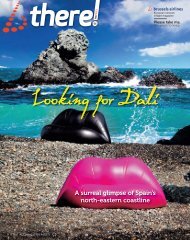november-2010
november-2010
november-2010
Create successful ePaper yourself
Turn your PDF publications into a flip-book with our unique Google optimized e-Paper software.
BUSINESS<br />
Businesstrends<br />
Probably the best<br />
water in the world?<br />
Carlsberg looks beyond beer<br />
The world’s fourth biggest brewer is<br />
considering expanding its product line.<br />
At Carlsberg’s annual investor day, chief<br />
executive Jorgen Buhl Rasmussen announced<br />
it could turn to bottled water and soft drinks<br />
– pointing to its successful launches in Russia<br />
of Somersby cider and Eve, a fruit-flavoured,<br />
low-alcohol malt beverage aimed at women.<br />
Without much fanfare, the group also<br />
recently released fruit beer Tuborg Lime<br />
Cut in Denmark and Norway.<br />
Rasmussen stated that the Copenhagen<br />
company was to target women in general,<br />
and northern and western Europe, saying,<br />
“When we look at innovation in the future,<br />
we will see products that support beer.”<br />
While beer sales are falling, Carlsberg claims<br />
operating costs per hectolitre of beer are<br />
also dropping this year, and is standing by<br />
its mid-term target for operating margin in<br />
its northern & western Europe division to<br />
rise to 15-17% in 10 years. In 2009, the<br />
margin was 11.6%. Carlsberg has entered<br />
into a new five-year multi-currency revolving<br />
credit facility of €1.75bn to fuel<br />
future growth. What exactly the<br />
funds will be used for remains<br />
unclear; some of the money could<br />
be used to refinance debt that is<br />
due in the near future, but there is<br />
much speculation, including talk<br />
of a possible takeover.<br />
Drinking ahead: Carlsberg’s future<br />
includes more than beer, as these<br />
new products testify<br />
66 Brussels Airlines b.there! magazine November <strong>2010</strong><br />
Tesco chief exec<br />
Philip Clarke is<br />
looking for online<br />
profi ts in Poland<br />
Supermarket sweep<br />
Big-name western European brands gain ground in Poland<br />
While supermarkets dominate western Europe, with a 70-80% market share, the corner shop<br />
has remained a big part of Polish life. Supermarkets only account for some 30% of sales in<br />
the country – but this is set to change as international giants such as British chain Tesco,<br />
German brand Real and Portuguese-owned Biedronka take an ever larger slice of the market.<br />
The Polish daily Rzeczpospolita estimates that 4,000 corner shops will close in <strong>2010</strong> alone.<br />
Biedronka has emerged as the leader of Poland’s supermarket sector. Offering no-frills<br />
shopping and discounted prices, the retailer entered the market in 1997 and expanded by<br />
buying out smaller rivals and opening new stores. In 2007, Biedronka was opening a new store<br />
in the country every three days; today its smiling ladybird logo graces the front of more than<br />
1,500 outlets. And <strong>2010</strong> has been a record-breaking year: second quarter sales rose by 28%<br />
to €1.13bn, reportedly accounting for 54% of Portuguese owner Jerónimo Martins’ profits.<br />
The competition is hotting up, however. Danish retailer Dansk Supermarked is planning<br />
a major expansion of its network of Netto stores in Poland, and one-time market leader Tesco<br />
is also striking back. The British giant believes it has a new weapon, hoping to revolutionise<br />
Poland’s online shopping sector when it debuts on the .pl domain next year.<br />
Nutrition from Nestlé<br />
Swiss giant to invest millions in new Health Science division<br />
Nestlé is aiming to pioneer a new industry that sits “between food and pharma”, to exploit the<br />
rising demand for nutritional products around the world. The company, based near Geneva,<br />
has announced the creation of Nestlé Health Science, which will start operations from<br />
January 2011 and will be run at “arm’s length” from the company’s food and beverage brands.<br />
The driving forces behind the initiative are ageing populations, increasing healthcare costs<br />
and the rapid advances in associated technology. The division takes responsibility for the<br />
HealthCare Nutrition portfolio, an area delivering €1.2bn in revenues last year. Among the<br />
products are Clinutren enriched food and drinks, Carnation instant breakfast and the Optifast<br />
weight-loss line. Nestlé has also established an Institute of Health<br />
Sciences, which is set to receive “hundreds of millions” of Swiss<br />
francs in funding over the next decade. Its remit encompasses<br />
research and translating findings into strategies that can be<br />
employed by the company. “In 10 years, we will be the undisputed<br />
leader in the new ‘health science nutrition’ business,” said chief<br />
executive Luis Cantarell. “Our development<br />
Nestlé plans<br />
capabilities will help drive product<br />
to take a big<br />
innovation and organic growth.” The division bite of the<br />
health science<br />
also plans to acquire or licence products.<br />
market<br />
IMAGE GWTTY IMAGES
















